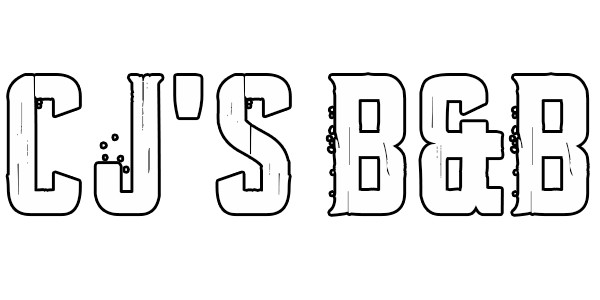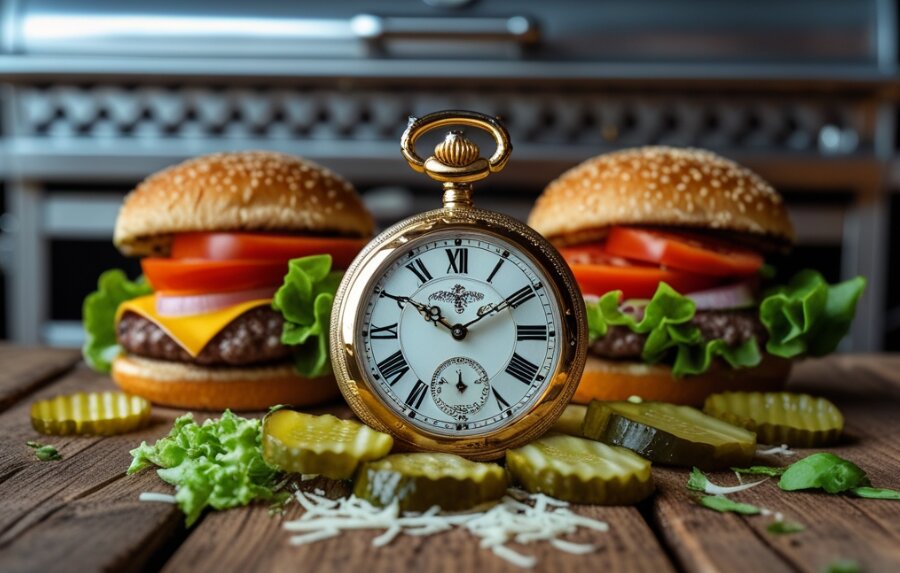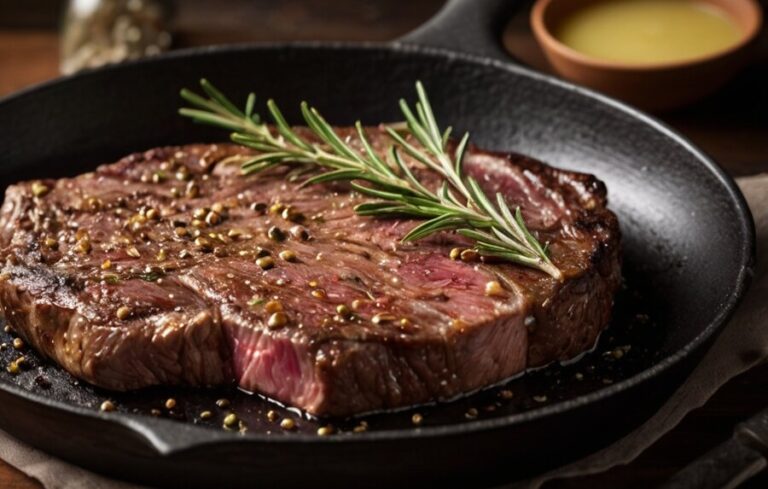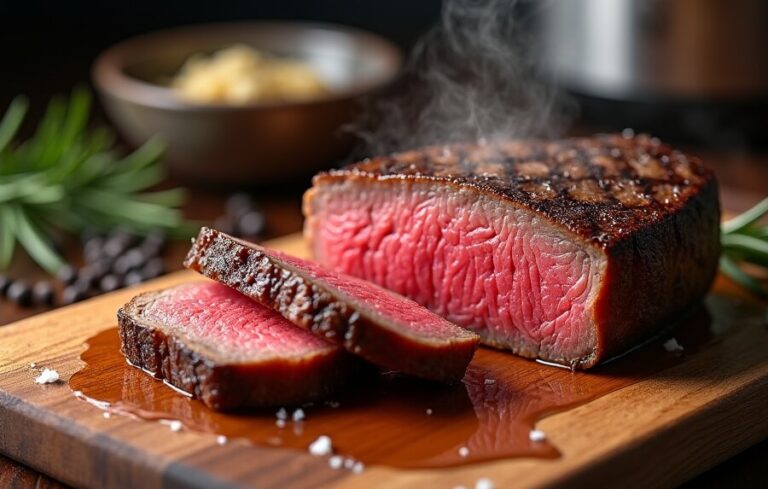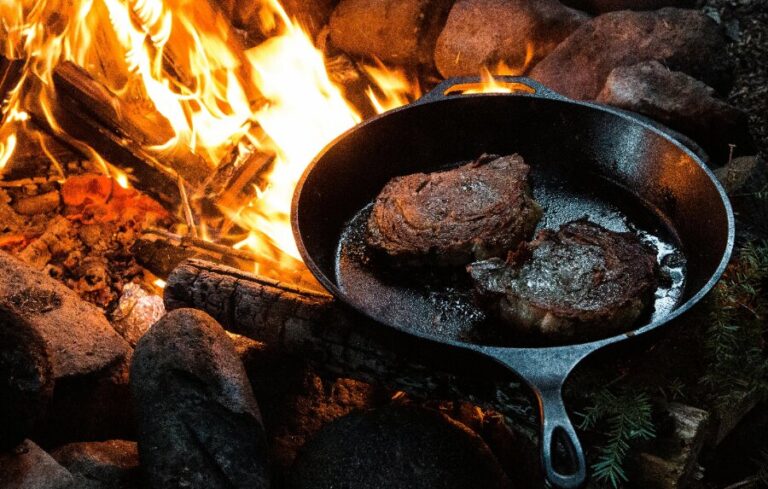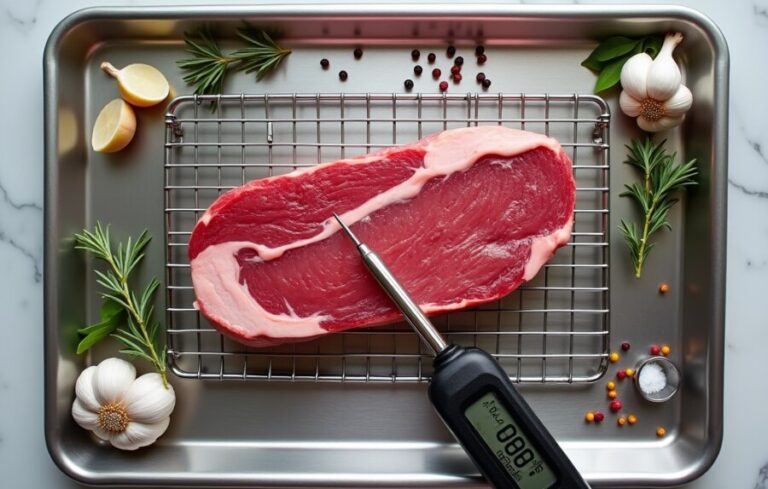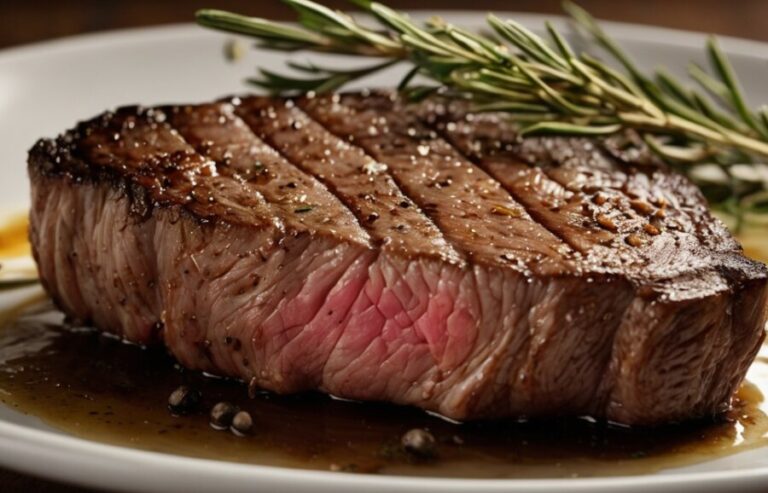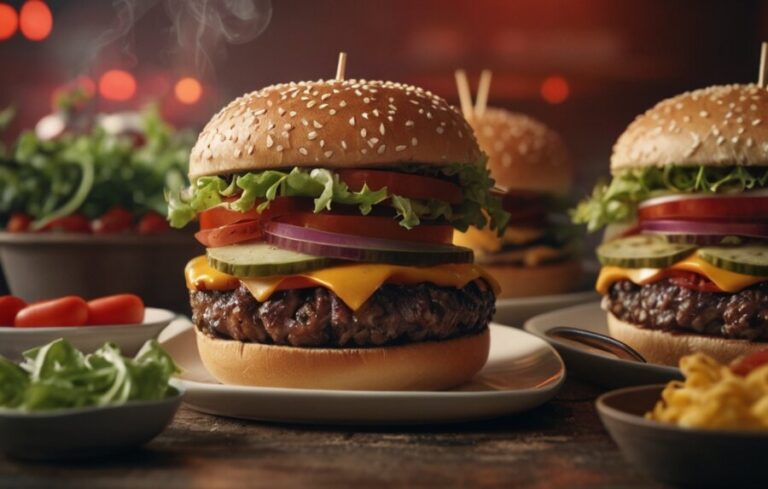Our evaluations and product assessments are conducted using a thorough and unbiased approach. Should you choose to buy any items through our provided links, we might receive a commission Read our disclosures.
Perfecting Grilling Time for Burgers: Tips for Delicious Results
Picking the Perfect Meat
Grilling burgers? Let’s talk meat. Your burger game changes depending on what you pick. For juicy, flavorful burgers, I usually go for ground beef with an 80/20 blend. That’s 80% lean meat and 20% fat – just the right balance to keep things moist and tasty.
If I’m in the mood for a lighter bite, ground turkey’s my go-to. But watch out: turkey’s sneaky and can get dry if it’s too lean. A good rule of thumb is to look for labels like 93 percent lean. To give turkey a boost, I mix in some eggs, sautéed onions, or even a dollop of mustard. Trust me, it makes all the difference (Food Network).
| Meat Type | Lean-to-Fat Ratio | Flavor Profile |
|---|---|---|
| Ground Beef | 80/20 | Juicy, rich |
| Ground Turkey | 93/7 (or leaner) | Mild, adaptable |
Want more meaty tips? Check out my other article on best meat for grilling burgers.
Get That Temperature Just Right
If there’s one thing I’ve learned, it’s that hitting the right internal temperature is crucial. The two-stage cooking method? Lifesaver. It’s when you have a cooler part of the grill and a hotter part. Start your burgers on the cooler side around 300°F, then finish them off on the hot side – aim for about 425°F (blog.thermoworks).
Understanding the right grilling time for burgers is key to achieving that perfect sear and juicy interior.
This technique? A game-changer. Let’s you better keep an eye on the temp, ensuring your burgers aren’t just safe, but mouth-wateringly good. I start my burgers slow, heating them up to around 135°F on the cool side. Then bam – sear them on the hot side. The gradual temperature change helps avoid overcooking, so you get that perfect bite every time (blog.thermoworks).
| Internal Temperature | Degree of Doneness |
|---|---|
| 135°F | Medium-Rare |
| 145°F | Medium |
| 160°F | Well-Done |
For even more grilling hacks, swing by my article on grilling temperature for burgers and find some secret sauces on grilling juicy burgers.
Happy grilling!
Grilling Techniques
Cooking a killer burger means nailing a few key tricks. I use two main grilling methods: the two-stage method and the direct heat method. Both have their perks, but getting them right makes a big difference.
Two-Stage Cooking Method
The two-stage method is my top choice for grilling burgers. I set up the grill with a cooler side and a super-hot side. First, place the burgers on the cooler zone, around 300°F. This lets them cook gently and stay juicy. Once their internal temp hits 135°F, I shift them to the hotter area, roughly 425°F, for a final sizzle. This quick sear gives the patties a delicious crust without overcooking the middle.
This method keeps my burgers juicy and minimizes carryover cooking, which can dry out the meat.
| Stage | Temperature | Purpose |
|---|---|---|
| Cool Side | 300°F | Initial cooking |
| Hot Side | 425°F | Searing |
Want more details? Check out my article on grilling juicy burgers.
Direct Heat vs. Two-Stage Method
Direct heat grilling is another approach. It cooks the burgers directly over the flames, heating them quickly. But, it comes with a catch—the risk of overcooking is high. The temp can jump from 153°F to 157°F in about 30 seconds, drying out the burgers fast.
On the flip side, the two-stage method raises the temp slowly. Burgers cooked this way take over a minute to move through the same temperature gap, keeping them moist and evenly cooked.
This is why I’m a two-stage fan. It delivers juicy, flavorful burgers with less chance of screwing up. Curious about getting your grill settings just right? Check out our article on grilling temperature for burgers.
All in all, both methods have their time and place. But for the perfect burger, I lean toward the control and consistency of the two-stage method. Whether I’m grilling for myself or friends, it’s my go-to for delicious results every time.

Grilling Times and Temperatures
Nailing the grilling time for burgers transforms that basic patty into a juicy masterpiece. I’ve found that getting familiar with grill settings and timing each side right makes all the difference.
Best Grill Settings
For top-notch burgers, crank up your grill to medium-high or high heat—somewhere between 350°F and 400°F. I use a two-stage cooking method, with the grill set to 300°F on one side for slow cooking and 425°F on the other for searing. This way, I can control the cooking process better and avoid overcooking (blog.thermoworks).
| Grill Side | Temperature (°F) |
|---|---|
| Cool side | 300 |
| Hot side | 425 |
| Direct heat | 350 – 400 |
How Long to Cook Each Side
Cooking times vary based on burger thickness and your cooking method. For my two-stage style, here’s a rough guide on the cooking times per side:
| Level of Doneness | Time per Side (minutes) | Internal Temp (°F) |
|---|---|---|
| Rare | 2 – 3 | 120 – 125 |
| Medium-rare | 3 – 4 | 130 – 135 |
| Medium | 4 – 5 | 140 – 145 |
| Medium-well | 5 – 6 | 150 – 155 |
| Well-done | 6 – 7 | 160+ |
I let the burgers heat away from direct flame until they hit around 135°F and then move them to the hot side for a quick sear. This helps keep them juicy and avoids sudden temp changes, making them more flavorful (blog.thermoworks).
Using a meat thermometer is a game-changer here. Stick it in the thickest part of the burger to check the internal temp, ensuring your burgers are safe and done just right (Webstaurant Store).
With these tips, I’m ready to light up the grill and wow everyone with perfectly cooked burgers. For more grilling tricks, check out my article on grilling juicy burgers and level up your BBQ game!
Beef vs. Turkey Burgers
So, you’re at the grill, huh? Deciding between beef and turkey burgers is like choosing between a classic rock anthem and a modern pop hit. Both can satisfy, but it depends on your taste buds and health goals.
Nutritional Showdown
Let’s pit these contenders against each other:
| Burger Type | Calories | Total Fat (g) | Saturated Fat (g) |
|---|---|---|---|
| Beef Burger (4 oz, 90% lean) | 225 | 12 | 5 |
| Turkey Burger (4 oz, dark & light meat) | 193 | 11 | 3 |
| Turkey Burger (4 oz, breast only) | 150 | 1.5 | 0 |
- A 90% lean beef burger clocks in at 225 calories and brings along niacin, vitamin B12, zinc, and selenium.
- A turkey burger with mixed meat is 193 calories—go all breast, and it’s just 150 calories.
Just a personal tip: ground turkey can get a bit dry, especially the super lean stuff. I like to toss in some eggs or sautéed onions to juice things up.
Keep It Safe, Grill Master
Nobody wants a BBQ disaster. Here’s the lowdown for cooking:
- Ground Beef: Get that bad boy to an internal temp of 160°F.
- Ground Turkey: Shoot for 165°F—salmonella won’t stand a chance.
Always grab your trusty meat thermometer and check the thickest part of the patty. Trust me, a little diligence here means nobody ends up regretting your BBQ.
So, beef or turkey? Now you know the score. Whether you go for something hearty or light, follow these tips to make sure your grill game is always strong and safe. Need some pro tips on grilling or seasoning? Check out my guides on grilling juicy burgers and how to season burgers for grilling.
Happy grilling!
Pellet Grill Tips
Grilling burgers on a pellet grill can totally change your outdoor cooking game. Here are some tips I swear by to get that perfect burger.
Crank Up the Heat
I always set my pellet grill to max temp—around 400 to 500 degrees Fahrenheit. This high heat locks in that smoky, wood-fired flavor we all crave in a burger. (Traeger)
Here’s the skinny on temperature settings:
| Temperature Setting | What It’s Good For |
|---|---|
| 400°F – 500°F | Perfect for that crispy crust and rich flavors. |
| 300°F – 400°F | Medium heat, cooks gently. |
| Below 300°F | Low and slow, good for smoking. |
Why Wood Pellets Rock
Wood pellets are amazing because they burn hotter and longer than traditional wood chips. They give you tighter control over the grill temp and infuse a consistent, deep smoke flavor that’s hard to beat. Plus, they produce less ash, so cleanup’s a breeze. (Traeger)
Check out these wood pellet perks:
| Benefit | Why It Rocks |
|---|---|
| Temp Control | Burns hotter and slower for even cooking. |
| Flavor Punch | Consistent smoke flavor makes your burgers pop. |
| Easy Clean | Less ash means less mess to deal with. |
When I make burgers, I shape my patties a bit larger than the buns to manage shrinkage. Making a small indentation in the center of each patty with my thumb helps them cook evenly.
For more grilling intel, peep our guides on grill temps for burgers and making juicy burgers. Don’t forget to read up on how to season your burgers just right and choosing the top-notch meat for grilling to get that burger bliss.
Cooking Burgers the Right Way
Using a Meat Thermometer
When I’m grilling burgers, my trusty sidekick is the meat thermometer. It’s my go-to tool to make sure my burgers are cooked just right and safe to eat. The USDA says burgers need to hit 160°F inside to avoid any nasty E. Coli (Food Network).
Using this gadget is straightforward. I stick the probe right into the thickest part of the burger, dodging areas near the grill grates. I wait a bit to get an accurate read before I take my burgers off the heat. If you haven’t snagged a meat thermometer yet, get on it! They don’t cost much but can make a huge difference in grilling those juicy burgers.
Temperature Tips for Doneness
Here’s a cheat sheet I follow to nail the perfect burger:
| Doneness | Internal Temp (°F) | Cook Time (Approx.) |
|---|---|---|
| Rare | 120 – 125 | 5 – 6 mins |
| Medium Rare | 130 – 135 | 6 – 7 mins |
| Medium | 140 – 145 | 7 – 8 mins |
| Medium Well | 150 – 155 | 8 – 9 mins |
| Well Done | 160+ | 8 – 9 mins |
Personally, I shoot for medium doneness. It keeps the burgers juicy with loads of flavor. Cooking them well done needs careful watch, usually about eight to nine minutes, to hit that fully-cooked center (Webstaurant Store).
With my meat thermometer, I get perfectly cooked burgers, every time. Want more tips on making juicy burgers? Dive into my grilling juicy burgers guide for more awesome tips!

